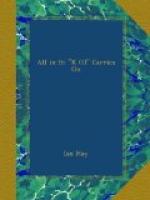Angus had a long while to wait, for all the youth of England—and Scotland too—was on fire, and others nearer the fountain of honour had to be served first. But his turn came at last; and we now behold him, as typical a product of “K to the nth” as Bobby Little had been of “K(1),” standing at last upon the soil of France, and inquiring in a soft Highland voice for the Headquarters of our own particular Battalion.
He had half expected, half hoped, to alight from the train amidst a shower of shells, as he knew the Old Regiment had done many months before, just after the War broke out. But all he saw upon his arrival was an untidy goods yard, littered with military stores, and peopled by British privates in the deshabille affected by the British Army when engaged in menial tasks.
Being quite ignorant of the whereabouts of his regiment—when last heard of they had been in trenches near Ypres—and failing to recollect the existence of that autocratic but indispensable genius loci, the R.T.O., Angus took uneasy stock of his surroundings and wondered what to do next.
Suddenly a friendly voice at his elbow remarked—
“There’s a queer lot o’ bodies hereaboot, sirr.”
Angus turned, to find that he was being addressed by a short, stout private of the draft, in a kilt much too big for him.
“Indeed, that is so,” he replied politely. “What is your name?”
“Peter Bogle, sirr. I am frae oot of Kirkintilloch.” Evidently gratified by the success of his conversational opening, the little man continued—
“I would like fine for tae get a contrack oot here after the War. This country is in a terrible state o’ disrepair.” Then he added confidentially—
“I’m a hoose-painter tae a trade.”
“I should not like to be that myself,” replied Angus, whose early training as a minister’s son was always causing him to forget the social gulf which is fixed between officers and the rank-and-file. “Climbing ladders makes me dizzy.”




